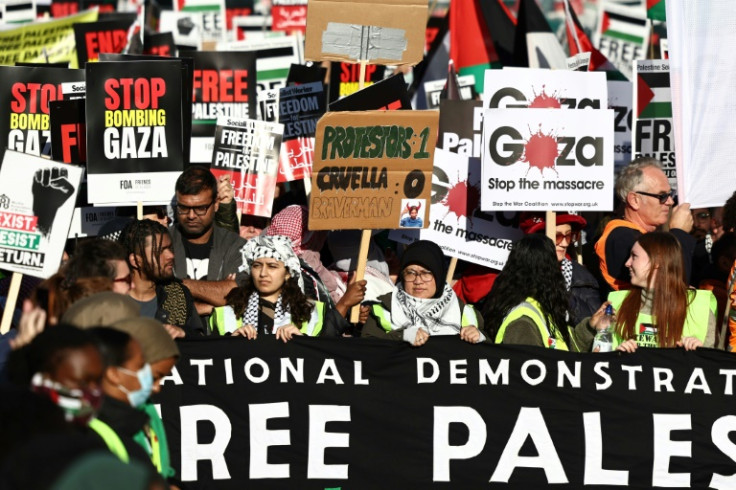King Charles III Leads Silence For British War Dead
King Charles III on Sunday led Britain in a two-minute silence to honour its war dead in his first remembrance service since being crowned, a day after violence marred commemorations.

King Charles III on Sunday led Britain in a two-minute silence to honour its war dead in his first remembrance service since being crowned, a day after violence marred commemorations.
The memorial was at the centre of ugly confrontations on Saturday, Armistice Day, when police scuffled with a group of counter-protestors -- opposed to a huge pro-Palestinian march -- as they attempted to reach the site.
Almost 10,000 veterans marched past the Cenotaph memorial in central London, while thousands more members of the public gathered in tribute to British and Commonwealth servicemen and women who have died in battle.
The king, along with Prime Minister Rishi Sunak and opposition Labour leader Keir Starmer, laid wreaths on the Cenotaph shortly after the nation fell silent at 11:00 am (1100 GMT).
"The courage and commitment shown by our servicemen and women, both today and throughout the generations that came before them, is humbling and I know many across the country will be honouring their memory today in quiet reflection," said Sunak.
"Recent events have served as a stark reminder that we cannot take the hard-earned peace we live in for granted.
"I am determined to ensure we never forget the ultimate sacrifice they have made," he added.
Marchers included 100-year-old Second World War veterans and children of servicemen and women who have died in conflict.
Remembrance Sunday is an annual commemoration held on the closest Sunday to Armistice Day, November 11, the anniversary of the end of the First World War to remember servicemen and women who have fallen in the line of duty since WWI.
It comes after a demonstration on Armistice Day saw hundreds of thousands of pro-Palestinian supporters march through London calling for a ceasefire in Israel's war in Gaza.
The bloodiest ever Gaza war broke out after Hamas fighters smashed through the militarised border with Israel on October 7, killing around 1,200 people, mostly civilians, and taking about 240 people hostage, according to Israeli figures.
More than 11,000 people, also mostly civilians and including thousands of children, have died since in Israel's relentless bombing in response, according to the health ministry in Hamas-run Gaza.
The London march went ahead after a week of tensions, which saw the government call for it to be scrapped, and police said they made scores of arrests, adding to ones from previous events, many for racial hate crimes.
Hardline conservative interior minister Suella Braverman, whose future hangs in the balance, said Sunday that "further action is necessary" to deal with the marches after apparent anti-Semitic incidents were recorded on Saturday.
Sunak is weighing up Braverman's future after she wrote an explosive newspaper article, apparently without his approval, accusing police of bias towards left-wing causes, prompting calls for her to be sacked.
But the interior minister, who is in charge of policing, again put her boss on the spot with her demand for action.
"The sick, inflammatory and, in some cases, clearly criminal chants, placards and paraphernalia openly on display at the march mark a new low," Braverman wrote on to social platform X, formerly Twitter.
"This can't go on. Week by week, the streets of London are being polluted by hate, violence, and anti-Semitism. Members of the public are being mobbed and intimidated. Further action is necessary," she added.
Braverman's words have strained her relationship with the police, although she thanked them for their efforts on Saturday and said that injuries sustained by officers at the main march and at a nationalist counter-protest were an "outrage".
Police said Sunday that they had charged seven counter-protesters with crimes including criminal damage and possession of an offensive weapon.

© Copyright AFP 2025. All rights reserved.





















